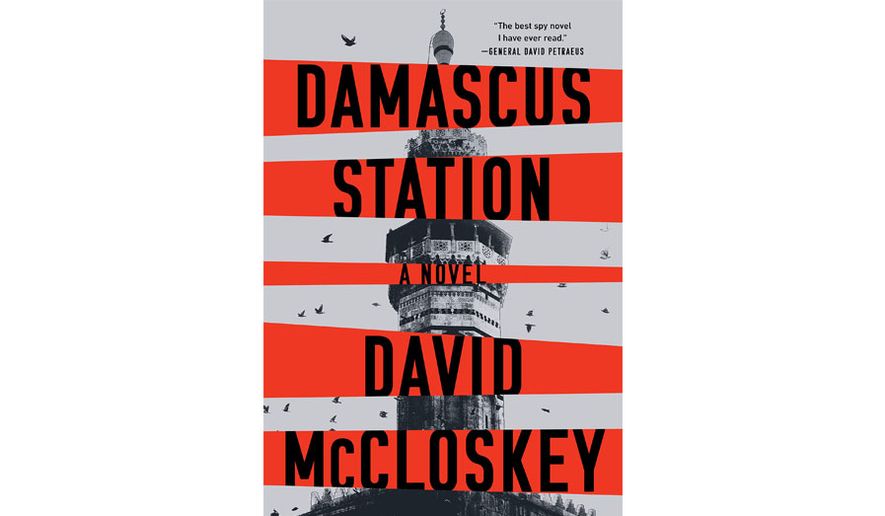OPINION:
Former CIA Directors Gen. David Petraeus and Leon Panetta, as well as Washington Times columnist and former CIA Chief of Middle East Operations, Daniel N. Hoffman, have all praised David McCloskey’s spy thriller “Damascus Station” for being a realistic portrayal of CIA overseas operations.
I reached out to Mr. McCloskey and asked him if presenting a realistic portrayal of the CIA was one of his reasons for writing the spy novel.
“The novel certainly aims for authenticity. This isn’t a shoot ’em up spy story. I wanted a real CIA case officer as the protagonist and, within reason, I wanted this to be a bit of a CIA ‘procedural,’ to bring to life the real world of intelligence, from its operations to its bureaucracy,” Mr. McCloskey replied. “I was struck while at the Agency at just how dramatic and intriguing the real-world business of intelligence could be, particularly the development and recruitment of human assets. The actual business of spying, it turned out, made a solid foundation for a spy novel. In it I found fertile ground for exploring the full gamut of human emotion and experience, and, of course, the opportunity to inject action and intrigue to make the plot propulsive.”
“That said, there are several spots in the book where I did ultimately sacrifice authenticity either to protect sensitive Agency tradecraft or where I thought it might weaken the storytelling,” he continued. “For example, there is a sequence in which CIA bomb techs test their work on cadavers. I had help creating my fictional bombs from a couple EOD techs, and when they read this part they said, ‘this is totally insane, the U.S. government would never do this.’ I said, I get it, but this is too fun, too cinematic to cut. I left it in.”
How would you describe the novel?
“Damascus Station is a spy yarn set in the early years of the Syrian uprising. It follows a CIA case officer, Sam, and his Syrian agent, Mariam, as they break one of the cardinal rules of espionage and fall into a forbidden relationship. They travel into Damascus to track down the killer of another CIA officer, and they are forced to confront the tension, conflict, and passion in their own relationship. Sam and Mariam come face to face with the brutal Hassan brothers, senior officials in the Syrian mukhabarat and military who are guarding a dark secret at the heart of the Syrian regime. Ultimately, it’s a novel about espionage, love, and what it means to be human in the middle of an inhuman war.”
“Sam Joseph is a good CIA case officer, a Minnesota boy who found the Agency through a Vegas-based talent spotter and has excelled in his job because he is an adept student of human nature and reader of people. He’s very good at poker, but not in a James Bond kind of way. The game taught him about human behavior and risk management. And he’s not a superhero spy, he’s an agent recruiter and runner who understands how people work and how to get them to spill their secrets. He is also passionate, and he makes a gigantic, potentially career-ending mistake as a result,” Mr. McCloskey said.
Mr. McCloskey, who grew up in Minnesota and studied international relations, worked as a political analyst in CIA headquarters and from field stations in the Middle East.
“For the most part the job was to help U.S. policymakers understand what was happening in the region, why it was happening, and what the implications might be for Washington. I also did a stint in our Counterterrorism Center, where the focus was more operational — trying to stop terrorist attacks,” Mr. McCloskey explained. “The most memorable set of moments for me were in the middle of the Syrian war, when I traveled around the region with a group of very senior Agency folks. I cannot share much about the trip, but it was one of those experiences in which, as a decently young person, I was given a peek behind the curtain of power. We sat down with some of the top people in a host of regional capitals. It was a masterclass in espionage and the way the Middle East really works. I’ll remember it for the rest of my life.”
Has the Syrian situation worsened since you wrote your novel?
“I wrote most of the novel in 2019, and since then the day-to-day fighting in Syria has declined as lines of control have hardened and the large number of foreign actors involved have pressed their local allies for ceasefires and the like. But the events of the novel take place in the early years of the conflict, roughly 2011-2013, and the war only got worse in the years that followed.”
“Damascus Station” is a well-written, fast-paced and suspenseful thriller.
• Paul Davis’ “On Crime” column covers true crime, crime fiction and thrillers.
• • •
“Damascus Station: A Novel”
By David McCloskey
432 pages
W.W. Norton & Company, Oct. 5, 2021
$27.95




Please read our comment policy before commenting.